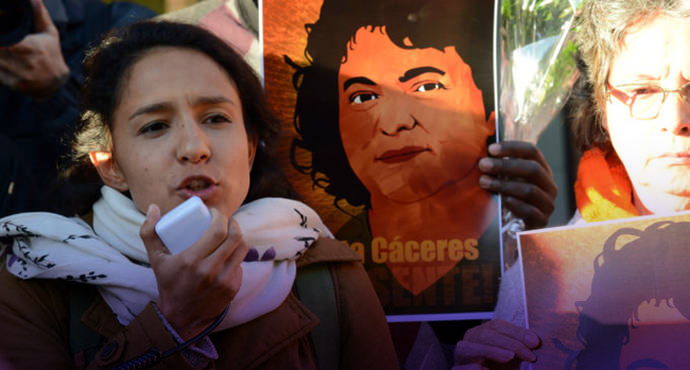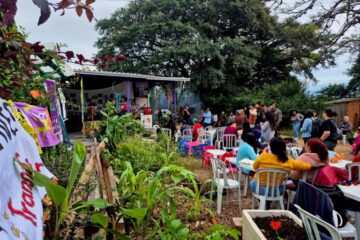Berta Cáceres was a pedagogue of the intergenerational struggle. During the strongest moments of both the community struggle and the struggle in Honduras, she always integrated the new generations, not only youth, but also children. I think this is why, today, there is a generation of young people who are also materializing Berta Cáceres’ dream of defending the territories.
Speaking also about the thoughts and the legacy that she left us: in the first place, she stated that it was always about the grassroots struggle. We cannot always engage in analytical thinking, if we have not as well accompanied the entire constitution of the grassroots organizational process. And that was a great teaching of hers: to not only abstract ourselves in thoughts, but also that those thoughts should spring from the struggle and territorial practices.
She was betting on this comprehensive struggle, not only–and she always positioned it within the Civic Council of Popular and Indigenous Organizations of Honduras [Consejo Cívico de Organizaciones Populares e Indígenas de Honduras—COPINH]. It is not only the struggle for the defense of territories or to defend rivers, but it is a transversal struggle against all those oppressions that exist both on the outside, as well as internally. And that is why the feminist struggle was born within COPINH: to confront those external oppressions. But it is not only the struggle for women’s rights and sexual diversity, it is also the struggle against racism, colonialism, capitalism. And this is also a very important lesson, which always allows us have a more integrated view of each one of our processes.
Something she also raised is the importance of this local struggle in challenging the global system of domination. This exercise of defending the rivers, of fighting for the recovery of the land, of fighting for women’s political participation, must also contribute to challenge all that capitalism, those financing banks, the domination from the state that ignores Indigenous peoples. So, this is a very valuable lesson for us.
Within these processes, always used as a methodology of struggle, popular education has been present as a tool that brings us closer to our own peoples. [Berta] also bet much on popular communication. This is why she was one of the promoters of COPINH’s community radio stations that could also carry the word. At all times, the same way of conceiving peoples’ lives was present and […] in that conception of life, there is also a wisdom that guides COPINH’s own comprehensive struggle.
In addition, something that Berta taught the youth, and also the entire resistance movement in Honduras, is the importance of identity and the worldviews that have often been marginalized by other more hegemonic worldviews. And how important it is that in all our processes of struggle we keep in mind our spiritualities, which are also our protection, which are also wisdom. That, in short, peoples’ resistance would not exist without this worldview, without our identity as a people. She always said that the moment in which these worldviews and these identities disappear, it would practically be as if, as Lenca people, we would have also disappeared; and we would have also given the victory to the colonizing and neo-colonizing [forces] that have tried to destroy our mechanisms of resistance.
Also, she said that the struggle is a permanent struggle. It is not a struggle that is going to take place over one year, two years, regardless of how the dynamics of our personal and collective processes change, but it is a permanent struggle that takes place in all spaces and at all times, and it is a struggle that we carry in our hearts, forever.
Berta also spoke of how important it is for the struggle to be carried out in the streets, as well as the popular struggle; there are many dynamics that could exist. The resistance that especially took place in Honduras, during the coup d’état. Since COPINH’s birth, one of the methodologies used was to take the struggles out to the streets to reclaim those proposals, and [to denounce] the fact that people are not being listened to by the governments or by the power structures that dominate them.
She spoke of the importance of diversity, of knowing that we are diverse, of knowing that we are different, plural—but that this doesn’t mean the separation of our struggles.
If anything characterized Berta Cáceres, it was her work in articulating different processes and views. Even when there were confrontations among political views, she worked very hard to find a solution to the divergences and to always state that, beyond these differences, we have common enemies, which are the components of this system of domination.
She fought and believed in the wisdom of peoples. She also believed in the justice of peoples in the face of the impunity of the state, companies, and all of those who participate in dominating. She believed that, as peoples, we also have our own mechanisms for building justice, defending our territories, and continuing the resistance that has been going on for more than 500 years.
She said, very clearly, that the peoples who do not fight for their existence are condemned to disappear. So she always called us to fight for our own existence.
She also stated that in the face of all adversities, in the face of all those obstacles that are present, and that sometimes make us feel so small, we must superimpose hope, fight with hope, fight with enthusiasm. That every single effort that is made will have a result; and that, at some point—maybe not when we want it, but at some point—, we will see those victories, we will also see the results of those efforts.

Berta Cáceres was born on March 4th, 1971 and was assassinated on March 2nd, 2016. With each passing day, as investigations progress—not only official investigations, but also those conducted through grassroots solidarity—, the accountability of companies connected to the hydroelectric project Agua Zarca for this assassination becomes clearer and clearer. David Castillo, the former executive president of Desarrollos Energéticos (DESA), which had economic interests in the territory of the Lenca people defended by Berta, was found guilty. COPINH continues to demand investigations into the masterminds behind this crime, while also taking Berta Cáceres’ legacy forward through its struggles to defend Indigenous peoples and territories.

The presentation above was made by Bertha Zúñiga Cáceres on March 4th, 2021 during the online launch of the International Feminist Organizing School (IFOS). Bertha is the daughter of Berta Cáceres and is the current coordinator of COPINH.




